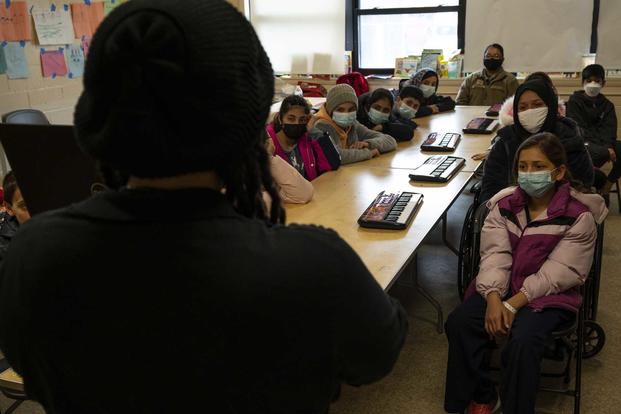With some Afghans evacuated during the massive Kabul airlift facing the risk of losing their legal status in the U.S. in six months, veterans groups are pushing Congress to find a way to let those rescued stay permanently.
More than 36,000 Afghans brought to the United States currently lack a direct pathway to secure permanent legal residency, according to a late January Department of Homeland Security report to Congress released publicly by Lutheran Immigration and Refugee Service, a not-for-profit organization helping resettle Afghan refugees.
Without a pathway to become legal permanent residents, Afghans could be forced to return to the danger they escaped from just months ago, veterans and refugee advocates warned Monday.
Read Next: US Soldiers in Ukraine Pulling Out Amid Warnings of Imminent Russian Invasion
"If you've ever said that you stand with the troops, then you must stand with us on this issue," said Shawn VanDiver, a Navy veteran who founded the Afghan Evac coalition of veterans helping with Afghanistan evacuations and resettlements.
"Make no mistake, we are going to show up. We'd like to show up in solidarity with you for standing with us, but we will show up in your town halls. We will make sure that voters know where you stood on the one thing that unites veterans across this country like no other," VanDiver added.
The comments came at a news conference outside the U.S. Capitol building in which several veterans joined with refugee advocacy groups to call for an Afghan Adjustment Act.
Many of the more than 76,000 Afghans brought to the United States in the immediate aftermath of the conquest of their country by the Taliban were former interpreters for the U.S. military who hold or have applied for what's known as Special Immigrant Visas, or SIVs.
But thousands of others were admitted to the United States under what's known as humanitarian parole, which allows refugees to temporarily enter the United States during an emergency. Parole does not provide a pathway to apply for legal permanent resident status, with some given one year and others two years of legal protection to stay in the U.S., a clock that started last summer for the Afghan refugees.
The group without a pathway for permanent residency includes family members of both U.S. citizens and SIV holders, as well as Afghans who could be eligible for SIVs but haven't been identified yet or would be eligible for another refugee status if they had applied before coming to the United States.
The bill the veterans' groups are promoting would provide a pathway for Afghan refugees in the United States to apply for legal permanent resident status.
Congress passed similar legislation in the 1960s for Cubans fleeing the Castro regime; in the 1970s for Vietnamese and other South Asian refugees after the fall of Saigon; and for Iraqis after both Operation Desert Storm and Operation Iraqi Freedom.
But efforts to do the same for Afghan refugees have stalled, even as lawmakers in both parties blast the chaotic U.S. military evacuations from Kabul over the summer and call on the Biden administration to do more to rescue vulnerable Afghans still stuck in Afghanistan. No lawmaker in either party has introduced an Afghan Adjustment Act yet.
Proponents of an Afghan Adjustment Act have had "hundreds" of meetings with lawmakers in both parties and, while there is bipartisan support for the idea, Republicans have some outstanding questions, said Chris Purdy, director of Veterans for American Ideals.
Officials in the Biden administration have also expressed support for the concept in private meetings, VanDiver said.
With Afghans' humanitarian parole set to expire in one to two years, veterans and refugee advocates on Monday described a ticking time bomb Congress must act to avert.
"There is another calamity coming," said Matt Zeller, a senior adviser at the Iraq and Afghanistan Veterans of America. "Once again, it's going to be America's veterans who are going to be burdened with taking care of these people, who will suffer yet another moral injury. We have already failed these people once. We cannot fail them again."
-- Rebecca Kheel can be reached at rebecca.kheel@military.com. Follow her on Twitter @reporterkheel.
Related: Afghanistan War Vet Helps Afghan Refugees Resettle in US













